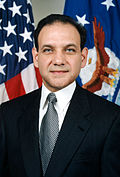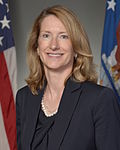Subordinates
The assistant secretary of the air force (financial management and comptroller) is supported by a principal deputy as well as senior leaders responsible for budget, cost and economics, and financial operations. The following are the key positions on the assistant secretary's staff. [7] [8] [9]
Principal Deputy Assistant Secretary of the Air Force for Financial Management and Comptroller (SAF/FM), a civilian member of the Senior Executive Service
Deputy Assistant Secretary for Budget (SAF/FMB), a major general
- Director of Policy and Fiscal Control (SAF/FMBF)
- Director of Budget Investment (SAF/FMBI), a civilian member of the Senior Executive Service
- Director of Budget Operations Personnel (SAF/FMBO), a brigadier general
- Director of Budget Programs (SAF/FMBP), a colonel
Deputy Assistant Secretary for Cost and Economics (SAF/FMC), a civilian member of the Senior Executive Service
- Director of Economics and Business Management (SAF/FMCE)
- Director of Integration, Workforce Operations, and Policy (SAF/FMCX)
- Director of the Air Force Cost Analysis Agency (AFCAA)
Directorate of Workforce Management and Executive Services (SAF/FME), a civilian member of the Senior Executive Service
- Director of Executive Support and Operations (SAF/FMEO)
- Director of Workforce Development (SAF/FMEW)
Deputy Assistant Secretary for Financial Operations (SAF/FMF), a civilian member of the Senior Executive Service
- Director of USAF Financial Reporting (SAF/FMFA), a civilian at the GS-15 pay grade
- Director of Special Program Accounting (SAF/FMFD), a civilian at the GS-15 pay grade
- Director of USSF Financial Reporting (SAF/FMFG), a civilian at the GS-15 pay grade
- Director of Mission Critical Assets (SAF/FMFM), a civilian at the GS-15 pay grade
- Director of Accounting Policy and Operations (SAF/FMFO), a civilian at the GS-15 pay grade
Deputy Assistant Secretary for Business Systems and Technology/Chief Information Officer (SAF/FMI), a civilian member of the Senior Executive Service
- Director of Information Systems and Technology (SAF/FMIA)
- Director of Budget Systems (SAF/FMIB)
- Director of Financial Systems Data (SAF/FMID)
- Director of the Defense Enterprise Accounting and Management System Functional Management Office (DEAMS FMO) (SAF/FMIE)
- Director of the Air Force Financial Systems Operation Program Management Office (AFFSO PMO) (SAF/FMIN), a civilian at the GS-15 pay grade
Deputy Assistant Secretary for Congressional Budget and Appropriations Liaison (SAF/FML)
- Director of DAF Programs and Committee Engagements (SAF/FMLE)
- Director of Strategy and Member Engagement (SAF/FMLS)
The assistant secretary of the air force (financial management and comptroller) also oversees the Air Force Financial Services Center and the Financial Management Center of Expertise. [8]
This page is based on this
Wikipedia article Text is available under the
CC BY-SA 4.0 license; additional terms may apply.
Images, videos and audio are available under their respective licenses.




























